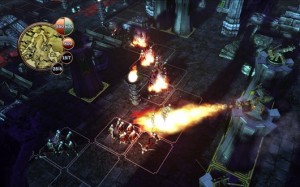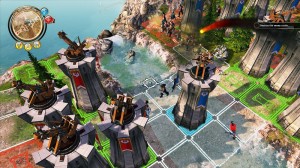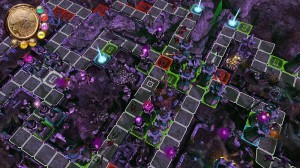 Ah Tower Defence! Once a novelty, you became a genre but then we all turned on you and hated you. You stuck around though and eventually we all accepted you. Now you fill our train journeys, hide behind other windows while we pretend to work and keep us awake, sleepless into the wee hours of the morning as we face just one more wave. Now that the genre has been established there are as many variations on the basic tower defence theme as you can imagine. Defenders of Ardania from Paradox Interactive is the newest entry into this competitive market, and it offers enough new and clever twists on the formula to make it interesting to fans as well as those with only a passing interest in the field of defending towers.
Ah Tower Defence! Once a novelty, you became a genre but then we all turned on you and hated you. You stuck around though and eventually we all accepted you. Now you fill our train journeys, hide behind other windows while we pretend to work and keep us awake, sleepless into the wee hours of the morning as we face just one more wave. Now that the genre has been established there are as many variations on the basic tower defence theme as you can imagine. Defenders of Ardania from Paradox Interactive is the newest entry into this competitive market, and it offers enough new and clever twists on the formula to make it interesting to fans as well as those with only a passing interest in the field of defending towers.
The fantasy setting isn’t going to win any prizes for great storytelling or originality though. From the moment you start up the game its clear you’re into some very standard Tolkein-esque fare. This is mitigated somewhat by some light humour throughout. Its not to the same extent as something like Magicka, which was much better at poking fun at fantasy conventions, but its a relief to see the game doesn’t take itself too seriously.
 Early impressions are mixed. The “Scottish” voice over seeks to ape Sean Connery and its possible that it sounds fine in other parts of the world, but here in Scotland it sounds very odd indeed. When this narrator disappears though and you are left with the games main soundtrack things improve significantly. The music is dramatic, over the top and absolutely amazing. The central theme of the soundtrack is so memorable and resonant that its unbelievable that its been made for a downloadable game. It wouldn’t be out of place on the resume of John Williams.
Early impressions are mixed. The “Scottish” voice over seeks to ape Sean Connery and its possible that it sounds fine in other parts of the world, but here in Scotland it sounds very odd indeed. When this narrator disappears though and you are left with the games main soundtrack things improve significantly. The music is dramatic, over the top and absolutely amazing. The central theme of the soundtrack is so memorable and resonant that its unbelievable that its been made for a downloadable game. It wouldn’t be out of place on the resume of John Williams.
Once you get to the main game there is a narrative that you play through but it has little impact on the action. In each level you face an enemy castle which spawns enemies. Your goal is simple: spawn troops from your own castle while building towers that defend your base to defeat your enemy. Complexity comes in the number of different types of towers that you can build as well as the types of troops you can send and the spells you can use.
 As you go from location to location on a fairly standard fantasy map you are introduced to these new units and defences as you go. While your basic foot soldiers are available from the start, new troops need to be unlocked with currency earned from defeated enemies. These soldiers range from rogues (speedy) to clerics (slow healers) and even flying characters (feathery). Different towers are better suited to defeating particular troops, so if you don’t have at least a few anti-air towers you are leaving yourself wide open to aerial attacks. The timing of your troops is key to successful attacks. As they all travel across the map at very different speeds, you want to try to get your slow healers to arrive at the same time as your speedy rogues to hit your enemy with lots of targets at once. At least that was my main strategy.
As you go from location to location on a fairly standard fantasy map you are introduced to these new units and defences as you go. While your basic foot soldiers are available from the start, new troops need to be unlocked with currency earned from defeated enemies. These soldiers range from rogues (speedy) to clerics (slow healers) and even flying characters (feathery). Different towers are better suited to defeating particular troops, so if you don’t have at least a few anti-air towers you are leaving yourself wide open to aerial attacks. The timing of your troops is key to successful attacks. As they all travel across the map at very different speeds, you want to try to get your slow healers to arrive at the same time as your speedy rogues to hit your enemy with lots of targets at once. At least that was my main strategy.
Even more important than your troops though are your towers. Careful positioning of these is essential to success. You are only allowed to place them in specific areas determined by the game, and you can’t completely close off paths. Rather you want to make sure that your enemy takes the longest rout possible to slow him down and whittle away at his troops. This means the early part of the game is essential as you race against the AI (or other human players) to grab the best spots for your own towers. Once claimed, the only way an enemy can take a spot you already control is to send specialist, tower-attacking enemies to destroy them. As the game progresses you will hit your tower limit. Once this happens you cannot build new towers until you sell existing ones, so much of your time is spent shifting towers from place to place in an effort to slow your enemies as much as possible while interfering with their own tower building plans.
 In singleplayer this is an enjoyable if occasionally sedentary experience. I found that once I had a good layout of towers there was little to do but spam my most powerful units. As the game progressed the AI got a little more challenging, but the pace of the game always seemed a little languid and I had plenty of time to check my Facebook messages while I played. This is helped somewhat by the ability to speed time with the right trigger, but even this didn’t help levels to progress so quickly that I couldn’t mess around with a mobile game while I played.
In singleplayer this is an enjoyable if occasionally sedentary experience. I found that once I had a good layout of towers there was little to do but spam my most powerful units. As the game progressed the AI got a little more challenging, but the pace of the game always seemed a little languid and I had plenty of time to check my Facebook messages while I played. This is helped somewhat by the ability to speed time with the right trigger, but even this didn’t help levels to progress so quickly that I couldn’t mess around with a mobile game while I played.
Multiplayer is altogether different. Two player games are still somewhat sedate, but with three or more everything is a little more hectic. When two players send their troops against a single enemy it can become frantic and desperate as you make constant adjustments to your enemies movements and the enemy types they send against you. There’s a great deal of scope for antagonising your opponents, and many of the games highlights involve sneaky towers placed at exactly the spot your enemy least wants them to be.
 The game isn’t much of a looker though. It has some strange animations, particularly when troops die and they seem to fall to the ground in slow motion. That being said, when the map is full of troops, particularly in large multiplayer games, the sheer scale and scope of the battles can make it look impressive. The presentations pretty welcoming though if a little predictable, and as I said earlier the music is uniformly excellent.
The game isn’t much of a looker though. It has some strange animations, particularly when troops die and they seem to fall to the ground in slow motion. That being said, when the map is full of troops, particularly in large multiplayer games, the sheer scale and scope of the battles can make it look impressive. The presentations pretty welcoming though if a little predictable, and as I said earlier the music is uniformly excellent.
Overall Defenders or Ardania is a solid tower defence game with some neat ideas. Its fantasy setting is a little dull but its variety of troops and subtly clever twists to the basic formula are welcome. While its decent as a singleplay game, as a multiplayer title it offers real scope to annoy your friends. Who could say no to that?
6 ex-friends out of 10
